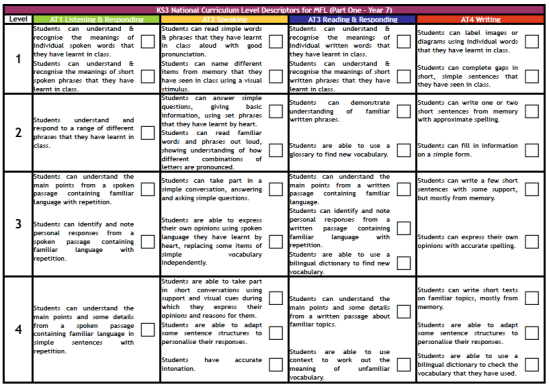I hope that at least the MFL teachers among my readers will have understood the title of today’s post!
As we all know, from September 2013, schools will no longer be required to assess their pupils using National Curriculum Levels at KS3. The DfE is not replacing this system of assessment and reporting, preferring instead to allow schools “to introduce their own approaches to formative assessment, to support pupil attainment and progression”. Whilst the DfE argues that NCLs are “complicated and difficult to understand, especially for parents” it is by now what they are used to, and has been a fairly useful, if somewhat arbitrary way to compare children’s progress across a range of different subjects.
Did someone say curriculum reform?
With this in mind, most schools seem to be sticking with NCLs in the absence of any viable replacement. (I have yet to meet a teacher whose school is scrapping them, but if yours is I’d love to hear from you! @MonsieurRMC).
The big problem with National Curriculum Levels in MFL has always been that, since pupils are awarded a distinct level in each of the four skills (listening, speaking, reading and writing), it is immensley difficult to give them an overall level for their progress in the language as a whole. Some departments ‘average out’ pupils’ levels, but this has always struck me as an extremely misleading method of reporting; a pupil may achieve a level 4 for reading but only a level 2 for writing and be awarded a level 3, despite the fact that he or she is not working at level 3 overall.
The temporary solution
From September 2013, I will be directing my department to assess and report pupils’ levels in a slightly more comprehensive way: all y7 parents will be sent a copy of the NCL sheet below, and each pupil will have a personal copy to keep in her book. When pupils have demonstrated sufficient evidence that they have fulfilled any of the criteria for any one skill, the teacher will record this with a tick in the relevant box. Pupils will only be awarded an ‘a’ sub-level when they have fulfilled all criteria for all skills at that level.

Pupils and parents will be able to track progress and identify areas for improvement simply by looking at their individual progress sheet at any given time.
This system should also facilitate reporting differences between other sub-levels; a ‘b’ sub-level will be awarded to a pupil who only needs to evidence one or two more criteria for that level. A ‘c’ sub-level will be awarded to a pupil who has fully achieved the level below plus one or two criteria of their next target level.
A simpler system?
My hope is that this system will make it easier for teachers to continually assess and keep track of their students’ progress, and for pupils and parents to identify areas in which the pupil needs to improve. Both of the PDF documents with the levels for Y7 and Y8 are available below, and constructive feedback is always welcome!
KS3 MFL NC Level Descriptors (Part 1) KS3 MFL NC Level Descriptors (Part 2)
